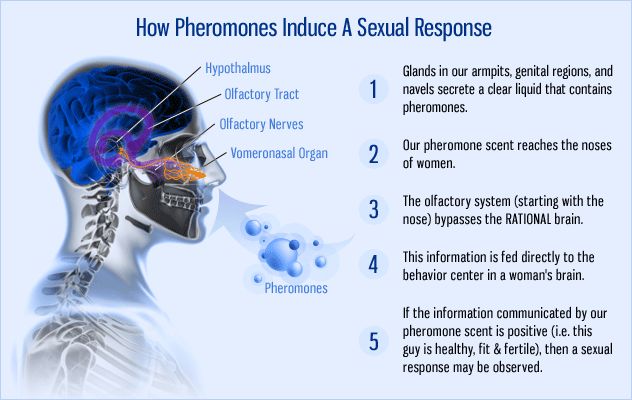Introduction to Pheromone Phobia
Enter a world where unseen forces have control over our feelings, wants, and behaviours. Welcome to the fascinating realm of pheromones – natural signals we release that can impact everything from attraction and connection to fear and hostility. Inspired by science fiction literature and films, there is a rising trend called “Pheromone Phobia.” But what exactly is this enigmatic condition? How does it affect us in our daily lives?
Pheromone phobia is an irrational fear or aversion towards the subtle chemical messengers that regulate communication within species. It arises from a lack of understanding or misconceptions about the role of pheromones in human behaviour. While some may see them as manipulative agents capable of controlling minds, others have idealised their ability to spark passion upon first meeting.
To further understand the complex network created by pheromones, we must examine their use in various animal species – how they aid insects in finding mates or allow animals like dogs to easily sense fear in humans. This leads us to ask: Can these invisible substances truly have such significant effects on human interactions?
“Come join us on an extraordinary journey as we examine the origins of Pheromone Phobia, uncover its links to past experiences and societal pressures, and explore ways for individuals to conquer unfounded fears related to these ubiquitous signals.”
The potential of the unseen-do you believe in the power of what cannot be seen with the naked eye? Let’s explore the potential of the unseen.
What are Pheromones?
It is often said that love is in the air, but it may be more precise to say that attraction is found in molecules. These molecules are known as pheromones – invisible signals that have a mysterious influence on our emotions and desires. But what exactly are they?
Pheromones are nature’s secret language, an ancient form of communication shared by countless species on this planet. They whisper messages through the wind, reaching our subtle olfactory receptors and bypassing conscious thought to trigger instinctual reactions within us.
These chemical messengers unlock hidden realms beneath the surface of human interactions. They can either draw us closer or push us away without any verbal communication. Pheromones have an uncanny ability to elicit a range of emotions, from fondness and fascination to immediate repulsion.
However, do not be fooled by their ethereal nature; these invisible forces have been scientifically proven to influence matters of romance, social bonding, territorial marking, and even mating rituals across different species for centuries. From fireflies dancing under the moonlight to animals marking their territories with powerful scents, pheromones quietly coordinate natural phenomena with a level of skill that surpasses human understanding.
How can we navigate this realm where chemistry is the dominant force? Understanding pheromones may hold the answer – their abilities act as both manipulators and empathetic catalysts, intertwining lives on intricate levels that science has only just begun to unravel.
Understanding the Fear of Invisible Signals
In a world full of numerous sensory experiences, it is easy to overlook the unseen signals that constantly surround us. We are constantly bombarded by a variety of sounds, sights, and smells every day, yet there is one aspect of our existence that often goes unnoticed: pheromones. These invisible chemical messengers hold great influence over our lives, affecting attraction, social interactions, and even behaviour.
However, despite their critical role in human interactions and bonding, some individuals experience an irrational fear known as “pheromone phobia.” This condition arises from a deep-seated discomfort or anxiety related to the concept of being controlled by these unseen forces.
The fear of invisible signals extends beyond mere scepticism; it delves into a realm where science and emotion intersect. Although we cannot see or consciously detect pheromones like we can with other stimuli, their influence on our lives cannot be ignored. For those experiencing this unique phobia, coming to terms with this contradiction can be overwhelming.
Understanding the roots of any fear-based condition is crucial for overcoming it. By exploring the origins and evolutionary significance of pheromones in both humans and other species, and examining how these chemical messengers have aided survival mechanisms throughout history, we can gain insight into why some individuals find them distressing.
Causes and Triggers of Pheromone Phobia

Causes and Triggers of Pheromone Phobia
Imagine a world where humans could communicate through invisible signals, similar to how animals do. While this idea may be intriguing to some, for those with pheromone phobia, it is a terrifying reality. To comprehend this fear, one must delve into the intricate reasons and stimuli that underlie it.
Many people who are afraid of pheromones have a fear of losing control. The thought that our bodies release these undetectable messages without our knowledge can be unsettling because it goes against our understanding of self-awareness. Additionally, societal expectations contribute to this fear – the pressure to always appear composed becomes overwhelming when we realise that we are constantly giving off these invisible chemical signals.
Childhood experiences often influence personal fears and anxieties. For example, an individual may have been teased or made fun of because others wrongly thought they had a bad smell due to their perceived inability to control their pheromones. These traumatic events can have a lasting impact and lead to defensive behaviours aimed at avoiding any type of interaction related to natural signalling
It is important to not only understand the causes of pheromone phobia, but also to uncover its potential triggers within each individual’s unique experiences. By delving into the depths of this mysterious condition, we embark on a journey towards em pathetically addressing and ultimately overcoming this fear, freeing those who suffer from it from invisible restraints..
Impact on Daily Life and Relationships
The fear of invisible signals, also known as pheromone phobia, can greatly affect our daily lives and relationships. These elusive chemical messengers are thought to play a significant role in attraction and communication between people. However, for those who suffer from this fear, navigating the world becomes a complex dance of uncertainty.
Imagine stepping into a crowded room filled with strangers, each emitting mysterious pheromones that you cannot see or understand. The air feels heavy with their influence, and the mere thought sends shivers down your spine. How does one navigate through life knowing that these invisible signals may be shaping countless interactions? It’s no surprise that building and maintaining relationships can feel daunting for someone struggling with such fears.
In romantic relationships, the fear of pheromones can have a significant impact. Those who are unable to understand these subtle signals may wonder if true connections are even possible in the midst of this overwhelming chemistry. Do sparks not fly in their presence by chance? Or is it their own hidden fears that prevent any potential flame from igniting?
In addition to intimate relationships, this widespread anxiety also affects friendships and professional interactions. Networking events become intimidating tasks rather than chances for personal development; introductions change from exciting possibilities to daunting situations filled with unease.
Overcoming Pheromone Phobia: Techniques and Therapies

In the vast world of fears and phobias, there is one that often goes unnoticed but can have a profound impact on our relationships – pheromone phobia. The fear of these invisible signals emitted by living organisms, particularly humans, may sound irrational to some, but for those who suffer from it, the anxiety is very real.
Exposure Therapy
Fortunately, there are various techniques and therapies that can assist individuals in overcoming their fear of pheromones. One commonly used approach is exposure therapy, where individuals gradually expose themselves to stimuli associated with their fear in a controlled manner.
In this case, it may involve exposing oneself to scents or situations that trigger anxiety related to the perceived effects of human pheromones. With repeated exposure under the guidance of a therapist, patients can learn to associate these experiences with feelings of safety rather than fear.
Cognitive Behavioural Therapy (CBT)
Cognitive Behavioural Therapy (CBT) is another effective method for treating phobias. It involves identifying and challenging negative thought patterns about pheromones, and replacing them with more realistic beliefs. This helps individuals change their perception of these signals. CBT also teaches patients coping strategies, such as relaxation techniques or positive self-talk, to use when they encounter triggering situations.
Mindfulness and Relaxation Techniques
Mindfulness and relaxation techniques provide another way to overcome this particular fear. Activities such as meditation or deep breathing exercises increase awareness of current experiences and foster inner peace. Integrating mindfulness into daily routines helps individuals build resilience against anxiety.
Case Studies and Success Stories
In the complex world of human relationships, it is intriguing to explore the hidden stories that reside in our unconscious minds. The mystery of pheromones has long fascinated scientists, sparking a search for comprehension of these unseen cues that influence our actions and feelings. Through examining specific examples and instances of success, a rich tapestry of experiences emerges, inviting us to further investigate the unexplored realms of pheromone perception.
Story 1:
Meet Jane—a vibrant young woman who had always struggled with social anxiety. Her fear of rejection held her captive in a lonely world until she discovered the power of pheromones. With trepidation, she dabbed on an alluring blend before attending a networking event, unaware that this subtle fragrance would alter her life’s trajectory forever. Like magic, conversations flowed effortlessly as people gravitated towards her magnetic aura.
Story 2:
Then there is John, a reserved individual who is constantly plagued by self-doubt when it comes to romantic interactions with others. A chance encounter led him down a fascinating path where he discovered the potential influence of pheromones on attraction dynamics. Through thorough research and experimentation, John uncovered a newfound charisma within himself, which allowed him to unlock doors that he had previously thought were out of reach.
Story 3:
Come join us as we introduce Sarah, a young woman who struggles with unexplainable discomfort in social settings. Constantly questioning her own value, she sought refuge in isolating herself from others. But everything changed when she came across our guidebook on comprehending and conquering the fear of unseen cues. Armed with a newfound understanding of how pheromones play a part in human interaction, Sarah bravely stepped out of her comfort zone on a quest for personal growth.
Conclusion
In conclusion, pheromones may be invisible signals, but they can have a significant impact on our social behaviours and relationships. It’s important to recognize and understand the fear of pheromones, or pheromone phobia, in order to overcome it. By following the tips mentioned in this article, such as educating oneself about their own body chemistry and embracing natural scents, individuals can learn to harness the power of these invisible signals for their benefit. Don’t let your fears hold you back from experiencing all that human communication has to offer. Embrace the world of pheromones with confidence and curiosity with confidence and curiosity.
If you want to see more content, then check it now!

